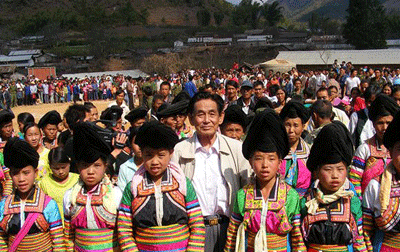
| By AUNG ZAW | Tuesday, September 8, 2009 |
Kokang leader Peng Jiasheng, who is now on the run from his former friends in the military regime, was one of the ethnic national leaders the Burmese government showcased in meetings with visiting foreign officials or UN officers.
But he is now a fugitive hiding from the military government that two weeks ago launched a search for illegal arms and drugs in his stronghold of Laogai.
 |
| Kokang leader Peng Jiasheng poses for a photograph with Kokang children at a local festival on February 3. (Photo: www. kokang.net) |
A state-run newspaper declared that Peng Jiasheng cannot escape from the “rule of law” and recommended that he surrender.
Now believed to be hiding in Wa territory, Peng Jiasheng and his group of associates and militia will not easily surrender to the regime.
A Kokang Chinese, he was born in 1931 in Hong Seu Htoo village in Kokang territory and served in the Kokang Revolutionary Force in 1960s. He was in touch with members of the Communist Party of Burma who were active along the China-Burma border.
Peng Jiasheng spent time in Beijing and upon his return, he entered Kokang territory in January 1968 as a commander of the Kokang People’s Liberation Army, a group that officially merged with the Burmese communists. He was first involved in the heroin and drug trade during the 1970s.
In 1989, Peng Jiasheng took a bold step and his group led a mutiny within the CPB and formed a Kokang armed group known as the Myanmar National Democratic Alliance Army (MNDDA). Three years later, Peng Jiasheng group was outmaneuvered by the Yang clan, Yang Molian and Yang Muxian, two Kokang Chinese brothers who supported the CPB. Yang Muxian was executed in Kunming in 1994 on drug trafficking charges. In later years, Peng Jiasheng and the Yang group joined forces.
In any case, by 1989 Peng Jiasheng and his brother Peng Jiafu had reunited with Asia’s renowned former drug trafficker Lo Hsing-han, who acted as a go-between for the regime to negotiate with CPB mutineers.
The drug lord, Lo Hsing-han, who is a Kokang-Chinese, was arrested in 1973 in Thailand and deported to Burma, where he received a death sentence in 1976. He was released during an amnesty in 1980.
Settled in Rangoon, Lo Hsing-han and his son Tun Myint Naing (aka Steven Law) set up Asia World Company—a company involved in the construction of homes and hotels, Rangoon port development and highway construction. Both father and son are now on the US sanction list.
Since Peng Jiasheng reached a ceasefire deal with the regime, the Kokang Chinese leader was often seen meeting with senior military leaders and visiting UN officials.
In the international press, Peng Jiasheng, like Wa leaders, is described as one of Burma’s most prominent drug traffickers and is widely linked to Chinese criminal gangs. However, the regime has protected him and all other drug traffickers.
Over the years, this meant the illegal drug business boomed, and Peng Jiasheng, Peng Jiafu and Lo Hsing-han controlled a large amount of the illegal drug trade, enjoying their new status as government-recognized militia commanders.
The Burma expert, Bertil Lintner, who has written several books on Burmese drug trafficking and the ethnic insurgency, notes that under the blanket amnesty, Peng and other Wa and Kokang Chinese leaders were involved in laundering drug money into the local economy.
The Peace Myanmar Group, one of the companies on the US sanction list, is connected to the Yang clan in Kokang.
It is believed that Peng Jiasheng has invested money through many Kokang channels into businesses in Burma and China.
In April 2009, a report “Burma and Transactional Crime” by the US Congressional Research Service stated that the regime has reportedly allowed and encouraged traffickers to invest in an array of domestic businesses, including infrastructure and transportation enterprises, receiving start-up fees and taxes from these enterprises in the process.
The report said, “The traffickers usually deposit the earnings from these enterprises into banks controlled by the military, and military officers reportedly deposit much of their crime-related money in foreign bank accounts in places like Bangkok and Singapore.
“In 2003, the Secretary of the Treasury reported that some Burmese financial institutions were controlled by, or used to facilitate money laundering for, organized drug trafficking organizations. In the same report, the Secretary of the Treasury also stated that Burmese government officials were suspected of being involved in the counterfeiting of U.S. currency.”
The report said that though there is little direct evidence of top-level regime members’ involvement in drug trafficking related corruption, “There is evidence that high-level officials and Burmese military officers have benefited financially from the earnings of transnational crime organizations. In the case of the drug trade, reports indicate Burmese military officials at various levels have several means to gain substantial shares of narcotics trafficking earnings.”
With such a past, the recent regime accusations labeling Peng Jiasheng a leader in the drug trade and illegal arms are nothing new.
However, it is interesting to note that the regime is singling out only Peng Jiasheng’s notorious past.
The rest of the current and former ethnic drug traffickers including Lo Hsing-han and the Wa leaders are still at-large, enjoying the benefits of the ceasefire “peace” in Burma. At least, for now.